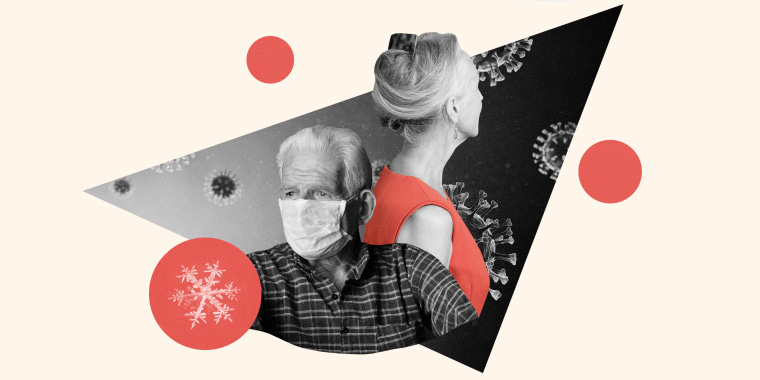As the coronavirus pandemic continues and flu season begins, leading to concerns of a "twindemic" in the United States, health experts are urging those who are high-risk for either or both illnesses to limit their social bubbles to stay healthy.
Dr. Anthony Fauci, the top infectious disease expert in the country, said on Sept. 10 that people needed to prepare to "hunker down and get through this fall and winter."
“We've been through this before,” Fauci said. “Don't ever, ever underestimate the potential of the pandemic. And don't try and look at the rosy side of things."
Despite Fauci's "cautious optimism" that a coronavirus vaccine will be developed this year, experts say that for those who have underlying health conditions or are over the age of 60, it's extremely important to limit your social bubble during the next few months.
Why should you limit your social bubble now?
Even if you've been having more social interaction over the past few months, it's important to start carefully considering your contacts now.
One reason is because of the increased risk of flu and coronavirus and the complications that accompany those illnesses. There's also concern that as the weather gets colder, more indoor activity will take place. Research has shown that the virus is less likely to spread in an outdoor environment.
"We have to assume that there's going to be some level of increased transmission and increased risk, so for those people who are in high-risk groups, it's important that the people that they're interacting with have some type of discussion about what types of activities other people are going to be doing," said Dr. Amesh Adalja, a senior scholar at the Johns Hopkins Center for Health Security in Baltimore, Maryland.
Dr. Dean Winslow, a professor of medicine at the Stanford University Medical Center in Stanford, California, also cautioned about asymptomatic transmission from younger contacts.
"Young people are capable of spreading both the flu and COVID-19, even if they themselves are not seriously ill or have no symptoms at all," Winslow explained. "It just makes sense for everyone to really redouble their efforts to do what we're supposed to be doing right now, which is continuing to maintain social distancing and wearing face coverings."
Winslow agreed with Adalja's concern about indoor activities.
"The risk of transmission with both flu and COVID-19 is highest in the indoor environment," he said.
Who should be especially careful this winter?
According to Adalja, there is a lot of overlap between people who are at risk for coronavirus and flu complications.
"For those in older age groups or with comorbid conditions, heart and lung disease, diabetes, immunosuppressed status, there seems to be overlap," Adajla said.
The flu affects two groups that the coronavirus does not, he said: Pregnant women and young children may be at risk for influenza complications, though they are not likely to experience severe coronavirus symptoms.
How can high-risk people protect themselves?
In addition to wearing masks, social distancing, and limiting contact with people, the best way people who are at high risk for either the flu or coronavirus can protect themselves is to get a flu shot.
"I really would encourage absolutely everyone to get the flu vaccine," said Winslow, adding that he himself was planning to get the vaccine within the next few days.
Dr. S. Patrick Kachur, a professor of population and family health at the Columbia University Medical Center, also advised getting the flu vaccine "as soon as it's available," and said that it's important to consider "additional measures" to ensure limited contact with others.
"In multi-generational households, I think not only the elderly and people with underlying conditions ought to be concerned, the younger adults who live in the household should probably be extra mindful during the coming cold and flu season," Kachur said. "...If you are going to be at home and you're at risk of severe disease or you're living with somebody who is, you really do want to make sure that you carefully identify a bubble with whom you associate."
"I think we are back at the situation where people really do need to carefully consider who they interact with," Kachur continued.
How can people get social interaction safely?
If you are at risk but are choosing to interact with people, experts recommend keeping an eye on state and county websites, which often share information about how many cases are in a given area. Use that data to gauge the risk of a social interaction.
"Most states are now setting up a dashboard that includes information about the number of cases but also the test positivity rates," Kachur said. "The positivity can give you a quick idea... If the proportion of people being tested is positive, that often indicates that transmission is increasing."
How can high-risk people maintain their mental health?
During the pandemic, there have been concerns about isolation and loneliness and the toll that that can take on mental health. In July 2020, 86-year-old psychotherapist Katharine Esty shared some tips that senior citizens and other high-risk people can use to avoid feeling isolated even while limiting their social interactions.
"The main thing is to reach out," she told TODAY. "When you’re feeling really blue, call a friend who is worse off than you. There’s nothing that will make people feel better than doing something nice for somebody else."
She also recommends creating a routine that you can stick to, which can help people feel "calm, peaceful and steady in this time." Other great tips include starting a new hobby or activity, or even adopting a pet.
"There are lots of people who are alone and it’s been really hard… it’s just devastating,” Esty, who lives in a retirement community in Concord, Massachusetts, told TODAY.



